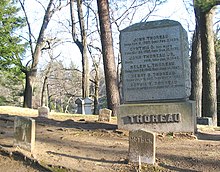Helen Thoreau
[6] Helen cultivated friendships with prominent abolitionists of the period, including Frederick Douglass and William Lloyd Garrison.
[4] In 1842, dismayed by the churches' failure to stand against slavery and conservative ministers' castigation of women's abolitionism, Helen stopped attending services.
[4] Helen Thoreau was described by a colleague in the anti-slavery movement as "endowed by nature with tender sensibilities" and "quick to feel for the woe of others".
[3] Along with her mother and sister, Helen Thoreau has been acknowledged as a significant abolitionist and a key influence on galvanising her brother Henry's involvement in anti-slavery efforts.
For decades, Concord women sponsored speakers, disseminated periodicals and other propaganda, circulated and signed petitions, raised money, [and] traveled to national conventions... [I]t was largely through these outspoken women sharing their homes that Concord's famous men came to accept leading roles in the fight against slavery.
